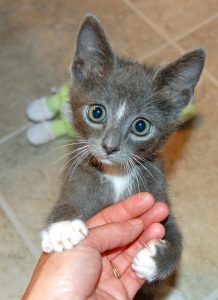 Nothing is better than having your content cat greet your guests with purrs and head rubs or a relaxed dog meeting new people with a happy tail wag instead of running to hide under the couch. A happy, well-socialized dog or cat makes life easier on everyone.
Nothing is better than having your content cat greet your guests with purrs and head rubs or a relaxed dog meeting new people with a happy tail wag instead of running to hide under the couch. A happy, well-socialized dog or cat makes life easier on everyone.
The best chance for having a well-socialized dog or cat begins with early positive experiences. Puppies and kittens have a socialization period during which they are most open to exploring new things, meeting new people and learning from experiences. In puppies that time is between 4 to12 weeks of age. In kittens it is from 3 to 9 weeks of age, but can extend up to 14 weeks. This time shapes the personality of your pet and influences how he will react to things in his environment in the future.
Proper socialization can prevent a puppy or kitten from being fearful of new situations in the future. Most puppy and kitten parents won’t get their new pet until it is 8 weeks or a little older. When your veterinarian allows your pet to be exposed to others, then it’s time to go to work to create a socially comfortable dog or cat.
 Introduce your young puppy or kitten to new sights, sounds and smells. Go slowly and give lots of praise and treats so each experience is a happy one. Come up with as many different experiences as you can. Have your new pet walk on carpet, hard floors, linoleum, grass and concrete. Have him meet lots of different people – old and young, short and tall, children and adults, people in wheel chairs and walkers, someone wearing a hat and another with sunglasses. Expose puppies to new smells by walking him in the woods, along a city street, to pet stores and to different homes. Get your pet used to new sounds, such as the vacuum cleaner, the dishwasher, alarm clock and television. The key is to watch closely and ensure the interaction is a positive one. If your new pet is afraid of something do not make them interact with it. Socialization needs to occur at a pace the young animal is comfortable with. Pets that are not properly socialized during this period are more easily stressed as adults and may become fearful.
Introduce your young puppy or kitten to new sights, sounds and smells. Go slowly and give lots of praise and treats so each experience is a happy one. Come up with as many different experiences as you can. Have your new pet walk on carpet, hard floors, linoleum, grass and concrete. Have him meet lots of different people – old and young, short and tall, children and adults, people in wheel chairs and walkers, someone wearing a hat and another with sunglasses. Expose puppies to new smells by walking him in the woods, along a city street, to pet stores and to different homes. Get your pet used to new sounds, such as the vacuum cleaner, the dishwasher, alarm clock and television. The key is to watch closely and ensure the interaction is a positive one. If your new pet is afraid of something do not make them interact with it. Socialization needs to occur at a pace the young animal is comfortable with. Pets that are not properly socialized during this period are more easily stressed as adults and may become fearful.
If you get a dog or cat when it is older, you can still help him associate new or fearful things with a positive experience. The process is the same – slow steps with lots of praise and treats. Care should be taken to develop a bond with a new pet though, before exposing him to new or scary things. It’s important to provide a sense of security for your pet first and then help them manage new experiences without distress.
